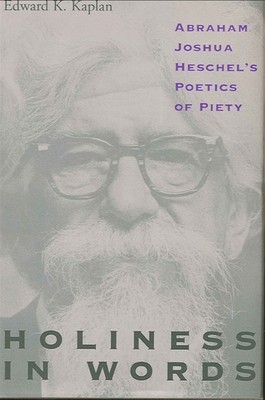
- We will send in 10–14 business days.
- Author: Edward K Kaplan
- Publisher: State University of New York Press
- ISBN-10: 0791428680
- ISBN-13: 9780791428689
- Format: 15.5 x 22.9 x 1.5 cm, minkšti viršeliai
- Language: English
- SAVE -10% with code: EXTRA
Reviews
Description
Holiness in Words: Abraham Joshua Heschel's Poetics of Piety is both an introduction to reading Heschel's works in English, and an in-depth study of the way his literary style can transform the consciousness of readers. Heschel's life and works respond to the contemporary crisis in religion, formulating positions on faith and despair, racism and social justice, the Holocaust, interreligious dialogue, and the availability of God's presence. We study Heschel's theory and use of literary language, his poetics of piety, in order to elucidate his narrative strategy to teach God-centered (or prophetic) thinking.
The book traces the major themes of his depth theology, awe and radical amazement, the meaning of symbol, ritual, prayer, and mystical insight. Historical and biographical information clarifies Heschel's implicit polemic with Martin Buber and a supplemental study guide provides sources for each chapter and suggestions for further thought and discussion.
EXTRA 10 % discount with code: EXTRA
The promotion ends in 23d.04:25:31
The discount code is valid when purchasing from 10 €. Discounts do not stack.
- Author: Edward K Kaplan
- Publisher: State University of New York Press
- ISBN-10: 0791428680
- ISBN-13: 9780791428689
- Format: 15.5 x 22.9 x 1.5 cm, minkšti viršeliai
- Language: English English
Holiness in Words: Abraham Joshua Heschel's Poetics of Piety is both an introduction to reading Heschel's works in English, and an in-depth study of the way his literary style can transform the consciousness of readers. Heschel's life and works respond to the contemporary crisis in religion, formulating positions on faith and despair, racism and social justice, the Holocaust, interreligious dialogue, and the availability of God's presence. We study Heschel's theory and use of literary language, his poetics of piety, in order to elucidate his narrative strategy to teach God-centered (or prophetic) thinking.
The book traces the major themes of his depth theology, awe and radical amazement, the meaning of symbol, ritual, prayer, and mystical insight. Historical and biographical information clarifies Heschel's implicit polemic with Martin Buber and a supplemental study guide provides sources for each chapter and suggestions for further thought and discussion.


Reviews